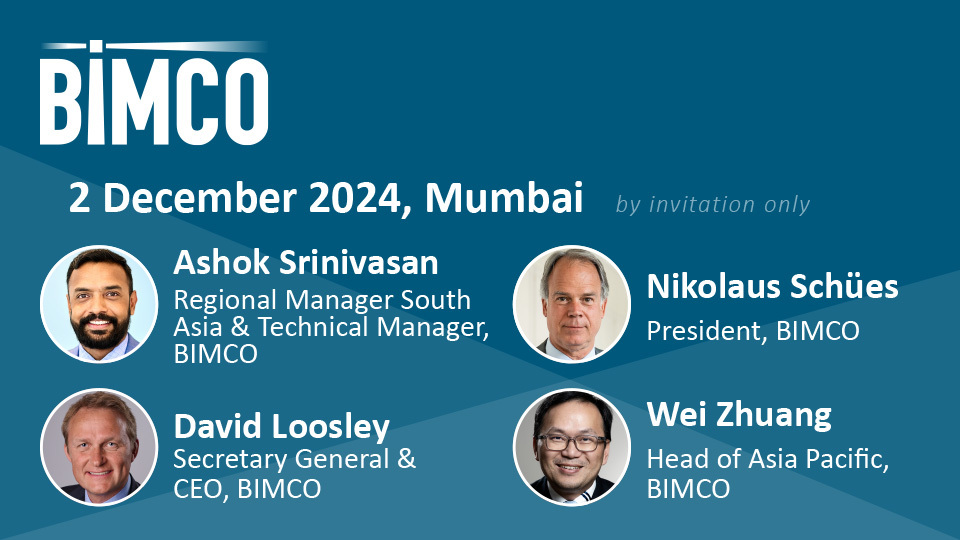BIMCO position statement 08: Biofouling Management
Overview
BIMCO's position has been approved by the BIMCO Board of Directors.
Background
The possible introduction of invasive aquatic species from biofouling is a potential threat to aquatic biodiversity. Biofouling accumulates on surfaces and structures immersed in or exposed to water. Biofouling is often described as micro- or macro- fouling. Microfouling is microscopic organisms that create a slime layer and macrofouling is visible growth of plants and animals.
In October 2001, the International Convention on the Control of Harmful Anti-fouling Systems on Ships (AFS Convention) was adopted by the International Maritime Organization (IMO). It sets forth requirements to prevent direct adverse impact on the environment from use of anti-fouling systems on ships.
In July 2011, the IMO also adopted a set of guidelines to provide a globally consistent approach to managing biofouling reduction and the threat posed by invasive aquatic species. In 2023, IMO adopted a revised set of guidelines to improve the uptake. The revised guidelines also recognise biofouling management as a means to improving a ship’s hydrodynamic performance, thereby reducing greenhouse gas emissions. There is therefore a strong economic, as well as an environmental incentive to manage biofouling well.
In 2024, the IMO will start to develop guidance on matters relating to in-water cleaning to facilitate the approval of cleaning by ports or regional bodies.
In case anti-fouling systems cannot maintain a fouling-free surface, the only practical and efficient option is to remove biofouling by using in-water cleaning. There is a lack of in-water cleaning facilities worldwide. Several countries have adopted local regulations prohibiting in-water cleaning.
BIMCO’s position
- BIMCO notes that in the absence of internationally agreed biofouling legislation, some states have taken the initiative to implement domestic legislation to address biofouling. BIMCO encourages states to align such biofouling regimes with the 2023 IMO Biofouling Management Guidelines to avoid potentially discriminatory and impractical regulations for the industry.
- BIMCO supports the development of mandatory IMO regulation on biofouling, provided ships can be ensured access to in-water cleaning. Introduction of measures that counterbalance the envisioned benefit should be carefully considered and only implemented if the negative consequences are acceptable.
- More areas enabling environmentally sustainable in-water cleaning should be allowed by coastal and port states and solutions that can help to lift prohibitions already imposed by certain countries or ports should be pursued.
- BIMCO supports proven safe, efficient and environmentally sustainable methods for in-water cleaning such as:
- Reactive cleaning capturing the waste substances that are removed from the surface during cleaning
- Proactive cleaning removing any microfouling prior to the establishment of macrofouling through carefully planned and regular cleanings.
- BIMCO supports the development of innovative technologies such as ultrasonic anti-fouling and nano-structured surfaces.
- BIMCO supports the GloFouling project funded by the UN and executed by the IMO to help implement the IMO guidelines on biofouling in developing coastal states.
- BIMCO strongly recommends the use of the BIMCO Hull Fouling Clause for Time Charter Parties 2019. The Clause suspends the owners’ speed and performance warranty after an agreed period of time of sitting idle on charterers’ orders until the hull has been inspected and, if necessary, cleaned at the charterers’ expense.
Feedback or a question about this information?
VPS Bunker Alerts
Veritas Petroleum Services (VPS) publish regular Bunker Alerts based entirely on fuel samples and have kindly permitted BIMCO’s Members to access this information.
The Bunker Alerts are not intended to be an evaluation of overall bunker quality in the port or area concerned, but usually highlight a specific parameter within the fuel which has raised a quality issue.
Want to stay up-to-date?
Register for updates about
{{Title}}
Receive emails when this topic is updated – you can choose how often.
Register NowELSEWHERE ON BIMCO
Chartering help & advice
This section contains a comprehensive source of information and guidance on chartering related matters. You will find invaluable information on many aspects of chartering distilled from our many years’ experience on advising members.
Learn about your cargo
For general guidance and information on cargo-related queries.
BIMCO Publications
Want to buy or download a BIMCO publication? Use the link to get access to the ballast water management guide, the ship master’s security manual and many other publications.





